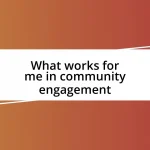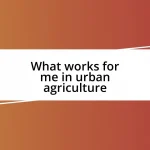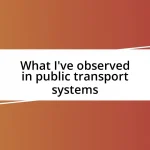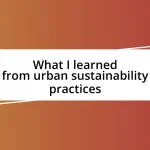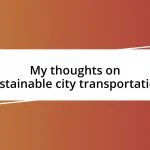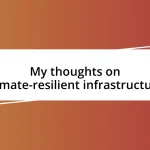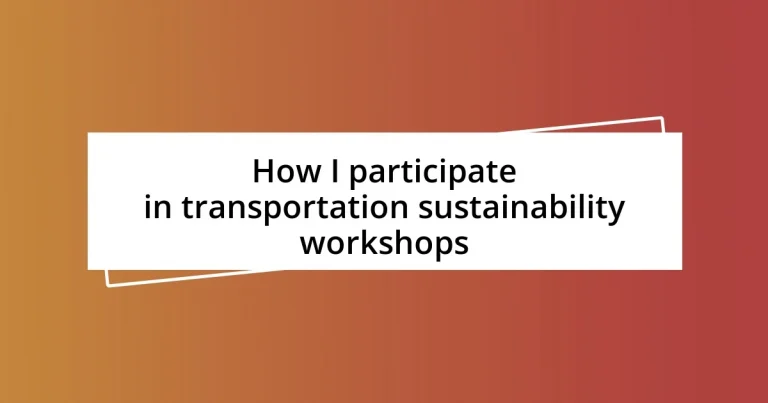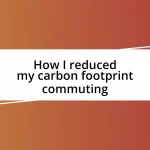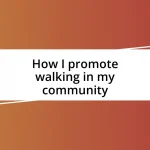Key takeaways:
- Transportation sustainability involves making choices that reduce carbon emissions and foster community engagement, emphasizing the role of infrastructure in promoting greener habits.
- Attending workshops enhances understanding through networking, hands-on learning, diverse perspectives, and empowerment, leading to renewed motivation for sustainable actions.
- Applying workshop learnings to daily life, such as reducing single-use plastics or engaging communities, can create significant local impact and drive personal commitment to sustainability.
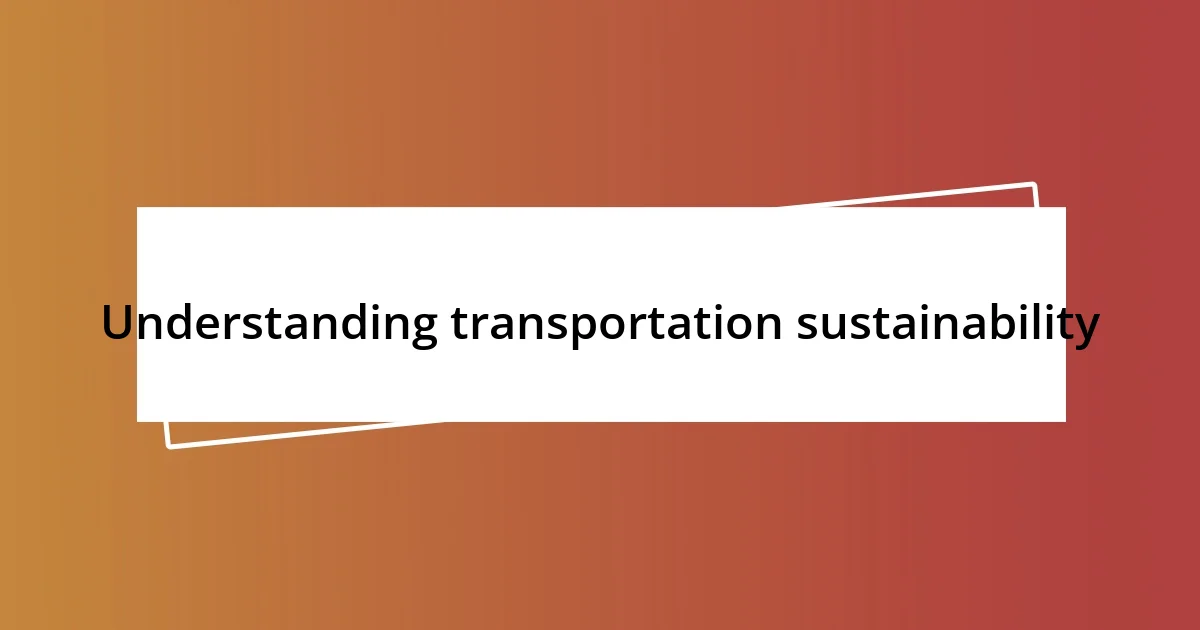
Understanding transportation sustainability
Transportation sustainability is all about creating a system that meets today’s needs without compromising future generations. I remember attending a workshop where we discussed how our daily commutes contribute to carbon emissions. It hit me to see the numbers—every small choice adds up. Imagine if we all shifted to public transport or carpooling; the impact would be monumental.
I often think about how much our surroundings influence our transportation choices. For instance, living in a city where bike lanes are abundant can inspire me to ditch my car more often. This reflects a fundamental aspect of transportation sustainability: infrastructure plays a crucial role. What if communities invested more in pedestrian-friendly designs? Wouldn’t that encourage a shift toward greener habits?
Moreover, understanding transportation sustainability goes beyond just reducing emissions; it involves fostering a sense of community. During one workshop, I felt a powerful connection with others who cared deeply about this issue. Sharing ideas about alternative transport methods made me realize how collective efforts can accelerate positive change. Isn’t it inspiring to think that, together, we can create a healthier planet?
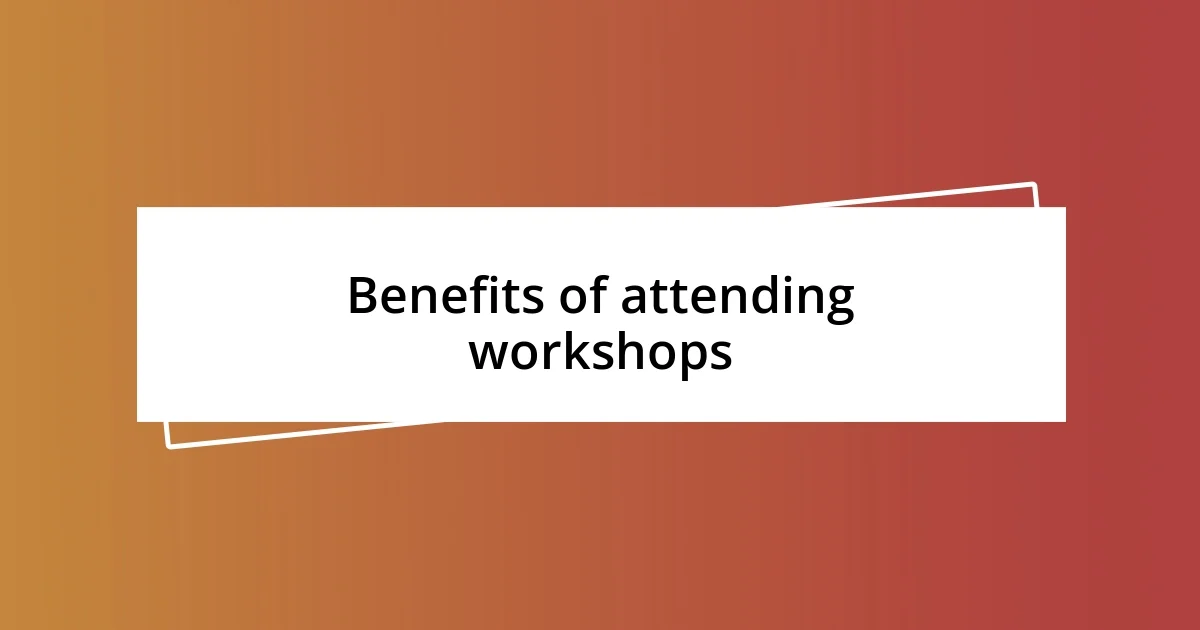
Benefits of attending workshops
Attending transportation sustainability workshops offers a wealth of benefits that can really enhance your understanding and commitment to the cause. I remember leaving my first workshop feeling energized and motivated, surrounded by like-minded individuals who were equally passionate about making a difference. There’s something special about the exchange of ideas in a group setting—it ignites a spark that’s often hard to find in solo research.
Here are some valuable benefits of participating in these workshops:
- Networking Opportunities: Meeting professionals and activists opens doors to collaborations you might not have considered.
- Hands-On Learning: Engaging activities help solidify concepts in a practical way, making the ideas stick.
- Resource Accessibility: Workshops usually provide valuable materials, guides, and links to further resources for ongoing learning.
- Diverse Perspectives: Listening to various viewpoints enriches my understanding and propels me to think outside the box.
- Empowerment: Feeling part of a larger movement enhances my motivation to take action in my own community.
Every time I attend, I find myself returning with fresh insights and a renewed sense of purpose. It’s hard not to feel inspired by the stories of success and the innovative practices shared by others; it really reinforces why this work is vital for our future.
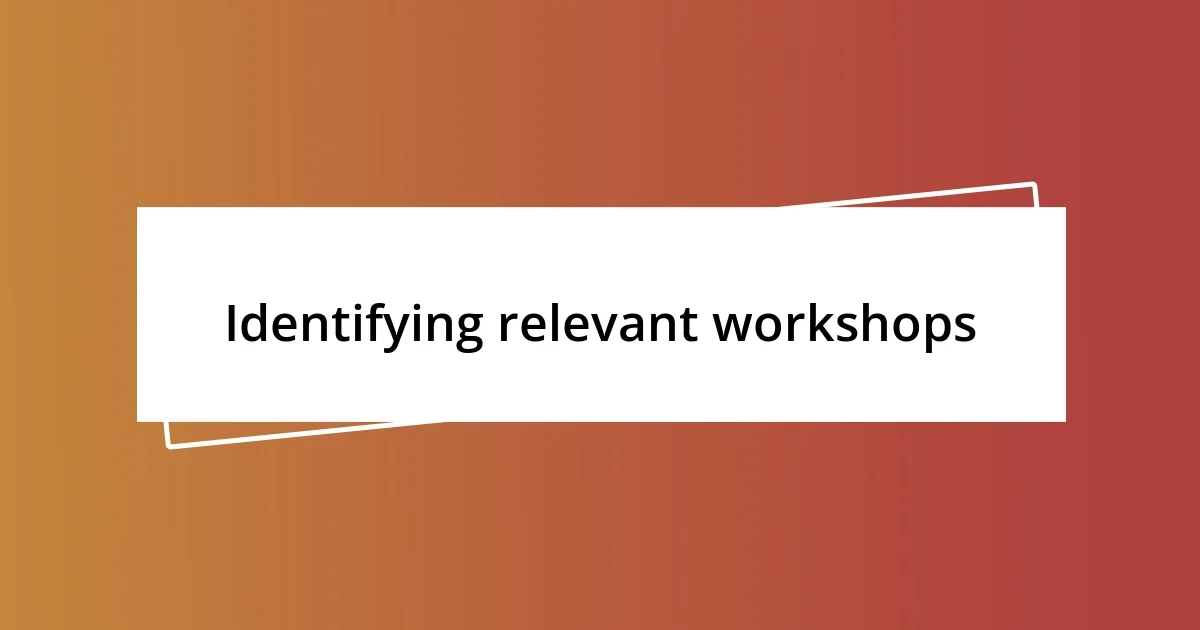
Identifying relevant workshops
Identifying relevant workshops can often feel like searching for a needle in a haystack, especially when there are so many options available today. One strategy I find effective is to define my specific interests within transportation sustainability—whether I’m passionate about urban planning, electric vehicles, or community engagement. For example, I once zeroed in on a workshop focusing on sustainable urban transport solutions, and it was enlightening to see how the right match can amplify my learning. It’s all about finding what resonates with you.
Additionally, I like to leverage social media and community boards to scout for workshops. I recall discovering a local event through a group on Facebook that was specifically aimed at reducing single-occupancy vehicle use in our area. Not only was the content relevant, but the event also fostered connections with local advocates. By engaging with these platforms, I can identify opportunities that align closely with my goals, making the learning experience far richer.
To streamline this process, I often create a comparison table to weigh different workshops against my priorities. Below is a simple representation of how I evaluate potential workshops based on their focus areas and formats:
| Workshop Title | Focus Area | Format |
|---|---|---|
| Sustainable Urban Transport | Urban Planning | In-Person |
| Electric Vehicles 101 | Technology | Online Webinar |
| Community Engagement Strategies | Social Impact | Hybrid |
Through this method, I find it easier to pinpoint which workshops will truly benefit my journey in transportation sustainability. Have you tried a similar approach? It can save so much time!
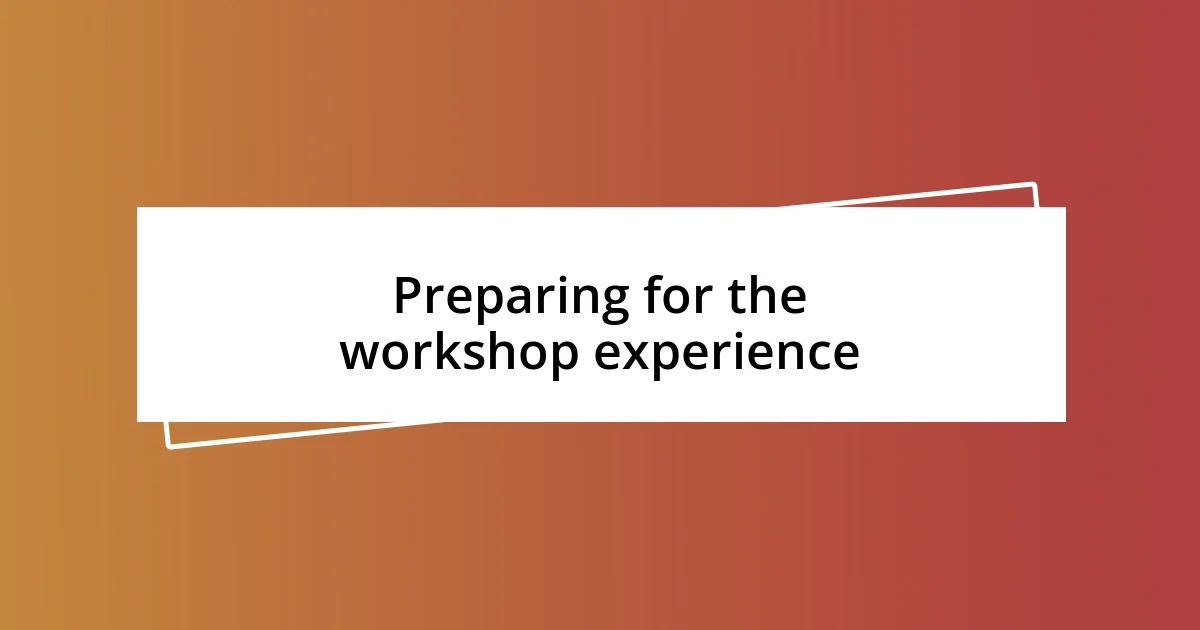
Preparing for the workshop experience
Preparing for a workshop experience starts well before the event itself. I like to gather any background materials or resources the organizer provides. The advantage? It helps me walk into the room with a solid foundation. I remember the anxiety before my first workshop—feeling lost in a sea of unfamiliar terms. But after reviewing the suggested reading, I found myself able to engage in discussions more confidently. How often do we let a lack of preparation hold us back?
In addition to research, I make it a point to set personal goals for each workshop. I ask myself what I hope to gain and which skills I want to develop. At a recent workshop on sustainable public transport, I aimed to learn practical strategies for advocacy. Reflecting on this goal throughout the day helped me focus on the sessions and discussions most relevant to my interests. It was like having a compass guiding me through a wealth of information.
Lastly, don’t underestimate the power of a plan for networking. I often jot down a few questions or topics I’d like to discuss with fellow attendees. When I attended a workshop last year, I found that reaching out with a simple question led to a meaningful conversation with a leading expert in urban design. It’s surprising how a few thoughtful inquiries can break the ice. So, what are you waiting for? Preparing effectively can transform the workshop into an unforgettable experience!
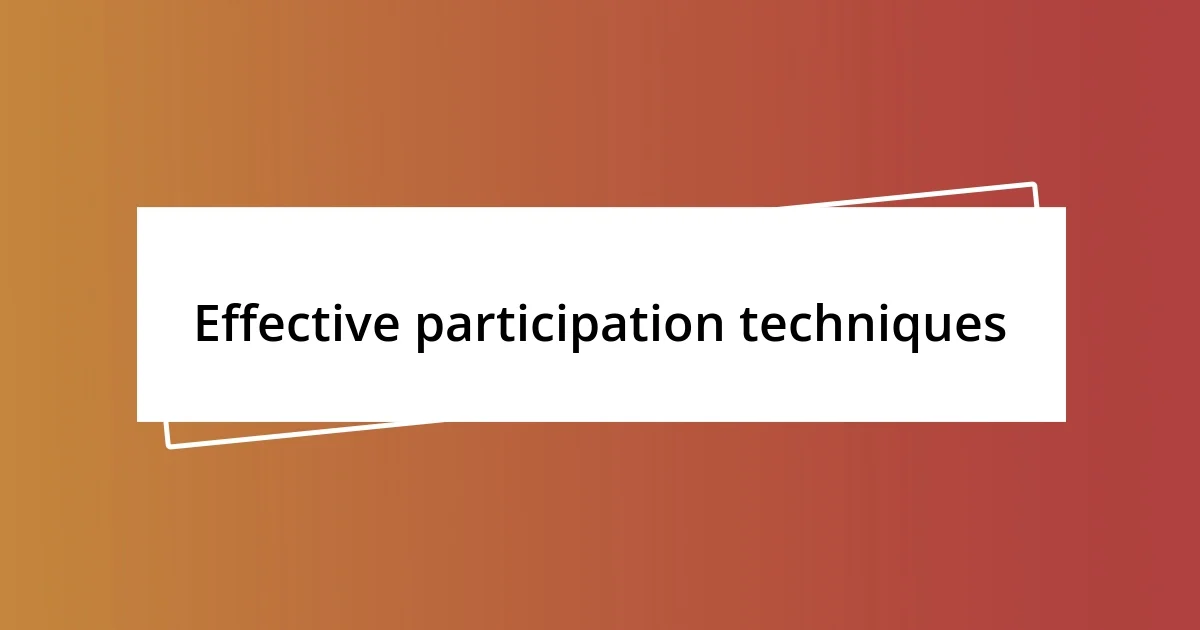
Effective participation techniques
Effective participation techniques revolve around engaging actively within the workshop environment. I remember feeling overwhelmed in my first sustainability workshop, surrounded by passionate attendees. It dawned on me that simply sitting back wouldn’t do justice to the experience. Now, I make it a point to contribute to discussions, ask questions, and even share my insights. It fosters a collaborative atmosphere that not only enriches my learning but also encourages others to participate.
Another strategy worth highlighting is the importance of taking notes. Early on, I realized that capturing key insights helps not only during the workshop but also for future reference. For example, during a recent session on green transportation solutions, I jotted down statistics that resonated with me. Later, this quick reference allowed me to integrate those insights into a community project I was developing. Have you ever thought about how note-taking can transform passive observation into active engagement? It’s a small practice that yields significant dividends!
Finally, emotional engagement can make all the difference in your experience. After attending several workshops, I noticed that when I actively connected with the content—by relating it to my own experiences or community issues—I left inspired and motivated. During a workshop focused on reducing carbon footprints, I shared my journey of carpooling in my neighborhood. The ensuing discussion sparked ideas that I wouldn’t have considered otherwise. This element of personal connection can invigorate your participation. How do you plan to infuse your personal experiences into future workshops? It might just elevate your engagement to a new level.
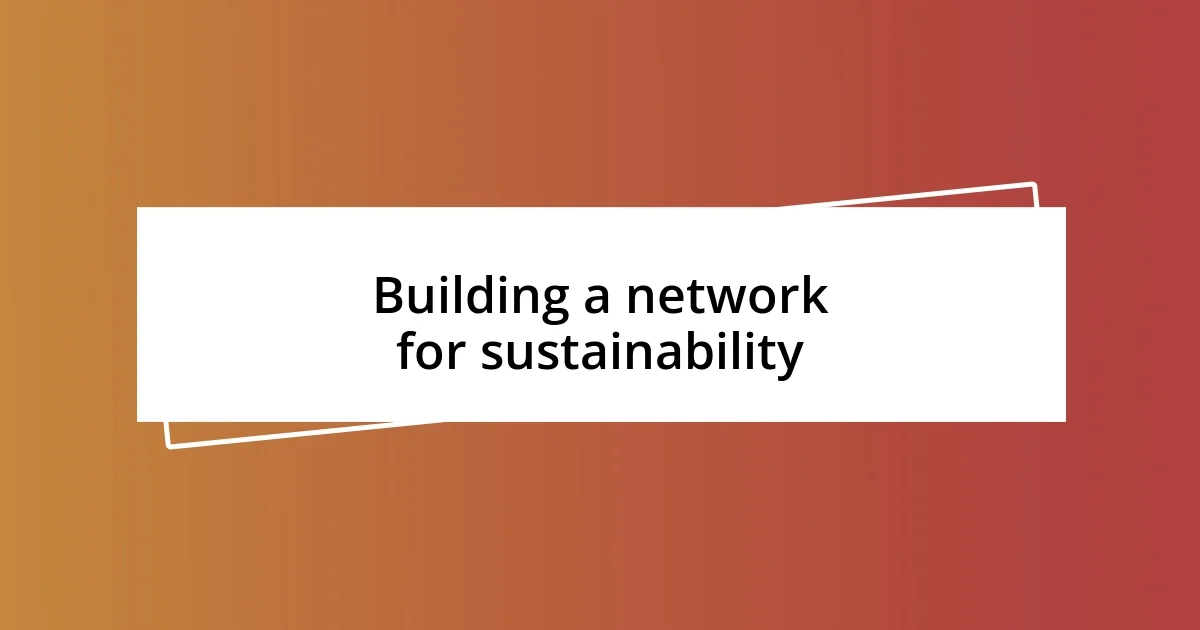
Building a network for sustainability
Building a network around sustainability is an enriching journey that extends beyond mere attendance. I remember my first encounter at a workshop where I timidly engaged with a few participants. Little did I know that those casual chats would blossom into meaningful connections. Have you ever experienced that moment when a shared interest ignites a conversation? It’s like discovering a new ally in your pursuit of sustainability.
As I continued to attend more workshops, I learned that networking isn’t just about exchanging business cards; it’s about creating lasting relationships. For instance, during one particularly impactful event, I struck up a dialogue with someone who was passionate about community gardening. This unexpected exchange led to our collaboration on a local green initiative. It made me realize that what begins as a simple conversation can evolve into powerful partnerships. So, how can you leverage such moments to expand your own network?
I’ve also found that following up after workshops is crucial for nurturing those connections. After meeting someone with similar interests, I often send a quick email or connect on social media. Just yesterday, I reached out to a fellow attendee from last month’s session, and we’re now planning a meet-up to brainstorm ideas on a sustainable transport project. It’s a small gesture, but it can set the foundation for future collaboration. Have you tried maintaining those connections post-event? These follow-up interactions can turn fleeting acquaintances into a solid support system in your sustainability journey.
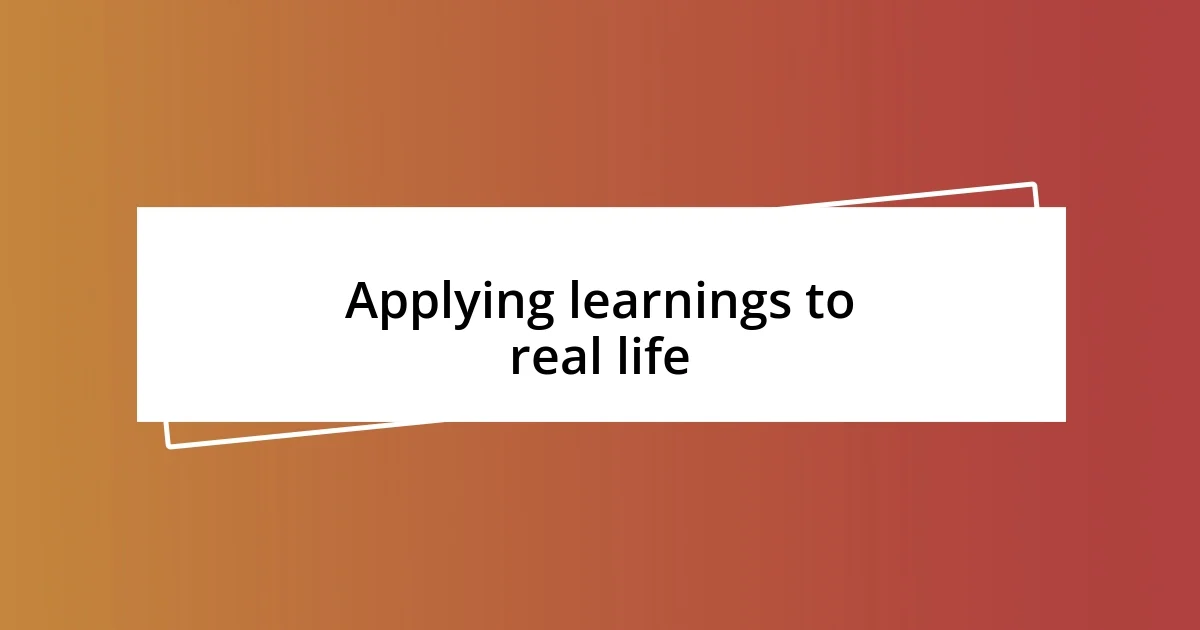
Applying learnings to real life
Applying what I’ve learned in sustainability workshops to my day-to-day life has been a game-changer. Recently, I participated in a session focused on reducing waste in urban transportation. Inspired, I decided to implement a personal challenge to minimize single-use plastics in my routine. Every time I opted for a reusable bag or container, I felt a sense of pride in making a tangible difference. Have you ever felt that rush when you realize your actions align with your values? It’s a rewarding experience, and it keeps me motivated.
In another workshop, we delved into the concept of community-led initiatives for greener transport solutions. I remember leaving that session with a spark of excitement, driven to engage my neighbors. I organized a small community meeting where we brainstormed ideas for enhancing local bike lanes and promoting public transport usage. The fuel this gave our community was incredible, and seeing neighbors come together to discuss solutions made me realize how collaborative efforts can amplify individual learnings. Are you tapping into your community’s potential like this? It might just lead to impactful changes.
Sometimes, it’s the little things that create significant changes in our personal lives. One actionable step I took after attending a workshop on sustainable commuting was to track my own travel habits for a month. I discovered I was taking my car more often than I realized. By using a public transit app and committing to taking the bus twice a week, I not only reduced my carbon footprint but also found it to be a more tranquil way of commuting. Have you considered how analyzing your habits can open up new avenues for sustainability? This strategy firmly connects the lessons from those workshops to my everyday choices.

